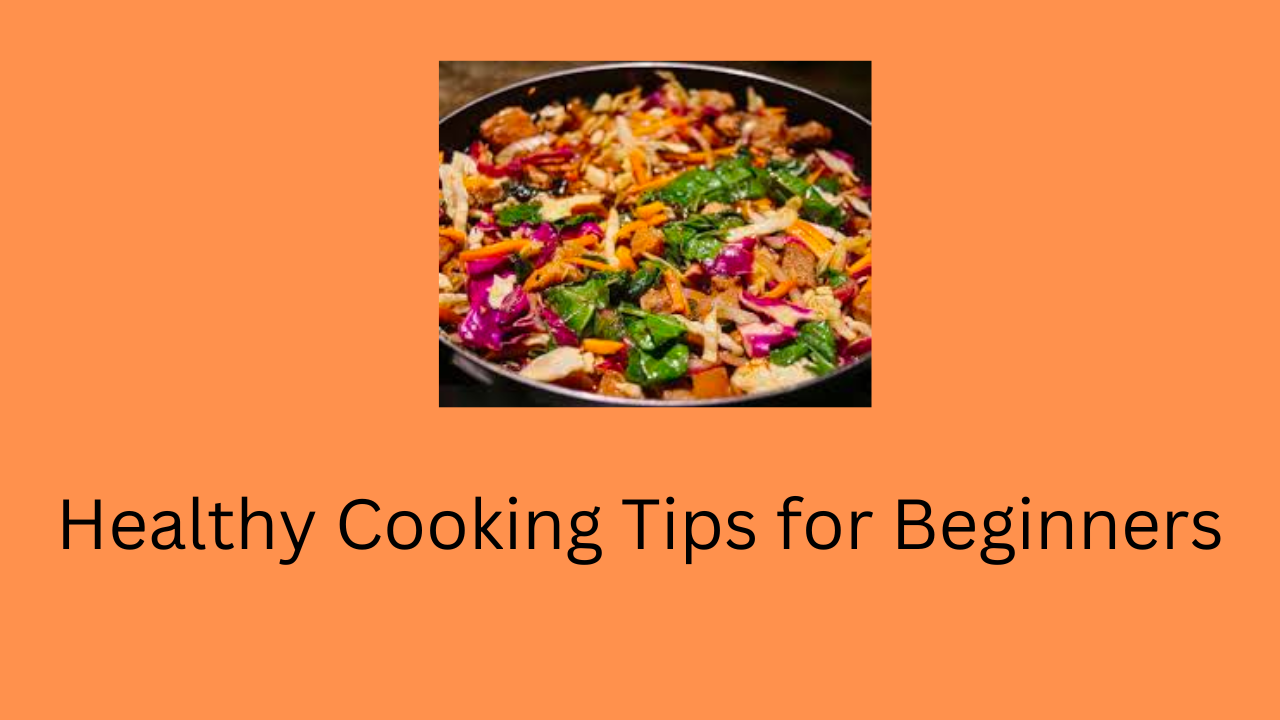Cooking healthy meals at home can be a great way to improve your diet and overall health. However, if you’re a beginner cook, it can be daunting to know where to start.
That’s where this blog post comes in. In this post, we’ll share some of our top healthy cooking tips for beginners. We’ll cover everything from choosing the right ingredients to using the right cooking methods.
Why is Healthy Cooking Important?
Healthy cooking allows you to take control of the ingredients and methods used in preparing your meals. By using fresh, whole foods and minimizing unhealthy additives, you can enhance the nutritional value of your dishes. Healthy cooking promotes overall well being, helps maintain a healthy weight, reduces the risk of chronic diseases, and supports a balanced lifestyle.
Healthy Cooking Tips for Beginners

Here are some tips for healthy cooking for beginners:
1. Start with simple recipes.
If you’re new to cooking, it’s best to start with simple recipes that use familiar ingredients. This will help you get a feel for the basics of cooking and build your confidence. There are many great resources available online and in cookbooks that offer simple, healthy recipes.
2. Use fresh ingredients.
Fresh ingredients are always the best option when it comes to healthy cooking. They’re packed with nutrients and flavor, and they’re often lower in calories and fat than processed foods. When you’re shopping for ingredients, look for fruits, vegetables, and whole grains that are in season. These will be the freshest and most affordable options.
3. Cook with healthy fats.
Not all fats are created equal. Some fats, such as saturated and trans fats, are unhealthy and can raise your cholesterol levels. However, other fats, such as unsaturated fats, are actually good for you and can help improve your heart health. Healthy fats include olive oil, avocado oil, nuts, and seeds.
4. Use low-sodium cooking methods.
Salt is a major source of sodium in the American diet, and too much sodium can raise your blood pressure. When you’re cooking, try to use low-sodium cooking methods, such as grilling, baking, or steaming. You can also reduce the sodium content in your recipes by using herbs and spices instead of salt.
5. Limit processed foods.
Processed foods are often high in unhealthy fats, sodium, and sugar. They’re also often low in nutrients. When you’re cooking at home, try to limit processed foods and focus on whole, unprocessed ingredients.
6. Get creative with your cooking.
There are endless possibilities when it comes to healthy cooking. Don’t be afraid to experiment with different ingredients and flavors. The more you cook, the more confident you’ll become, and the more fun you’ll have.
7. Don’t be afraid to ask for help.
If you’re struggling to learn how to cook healthy meals, don’t be afraid to ask for help. There are many resources available, such as cookbooks, websites, and cooking classes. You can also ask your friends, family, or neighbors for advice.
Here are some additional tips for healthy cooking:
- Plan your meals ahead of time. This will help you make sure you have all the ingredients you need and that you’re not tempted to order takeout.
- Make a grocery list. This will help you stay on budget and avoid impulse purchases.
- Cook in bulk. This is a great way to save time and money. You can freeze leftovers for later meals.
- Label your food. This will help you keep track of what you have in your fridge and pantry.
- Clean up as you go. This will make the cleanup process much easier.
With a little practice, you’ll be a healthy cooking pro in no time. So get started today and enjoy the delicious and nutritious meals you can make at home.
Conclusion
Cooking healthy meals at home doesn’t have to be complicated. By following these tips, you can easily get started on your healthy cooking journey. So what are you waiting for? Start cooking today.
FAQS
How can I reduce unhealthy fats in my cooking?
One way to reduce unhealthy fats is to opt for cooking methods like baking, grilling, steaming, or sautéing instead of deep-frying. When using fats and oils, choose healthier options such as olive oil, avocado oil, or coconut oil in moderation. Limit the use of butter, lard, and hydrogenated oils, as they are high in unhealthy saturated and trans fats.

